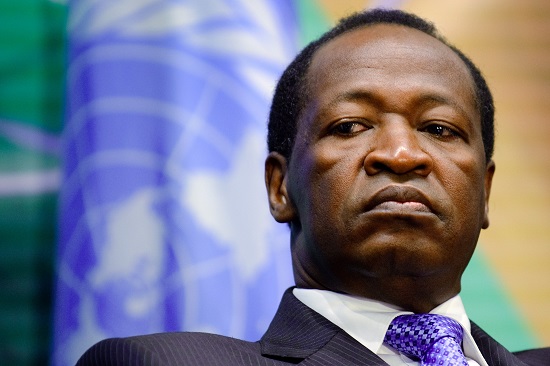
Originally written in December, 2014. Posted here as background to today’s crisis in Burkina Faso.
The lack of progress in the rural standard of living and the lack of jobs for youth had led to growing unease. Blaise Compaoré’s proposal to change the term limits set in the Constitution was the issue which set fire to the discontent a year ago.
Blaise Compaoré, whose 27 years of rule over Burkina Faso came to an end on October 31, 2014, is now living in Cote d’Ivoire, home of his wife Chantal Terrasson. She has long been considered as the “Lady Macbeth” of West African politics pushing her husband to take larger roles on an ever-wider West African stage. At the time, she was suspected as having pushed Blaise Compaoré to kill his predecessor as president of Upper Volta, Thomas Sankara, in October 1987. Sankara and Compaoré were both young military officers who had plotted together to stage a military coup in August 1983 and were considered to be close friends.
Thomas Sankara, the more outgoing and ideological of the two, was named president. He began campaigns of rural development and reform based on the mobilization of village workers. Sankara encouraged community or collective forms of agriculture in a country where 95 percent of the population lived in the rural area. Sankara also became an anti-colonial voice on the world scene such as his address to the UN General Assembly in October 1984. Sankara, influenced by the writings of Frantz Fanon, was highly critical of what he considered to be the neo-colonial economic policies of the European States, especially France, the former colonial ruler. France had kept close economic ties to Upper Volta and considered it as part of the French zone of influence in West Africa.
Blaise Compaoré eliminated from the Administration those considered “too close” to Sankara and built a strong Presidential Guard, the only part of the Army that was heavily armed and well trained. Although Compaoré had at first participated in Sankara’s rural development efforts, he quickly tried to find a wider West African focus for his activities. As has come out in the trial of Charles Taylor, the former Liberian leader, Compaoré played a role in the uprising in Liberia and Sierra Leone; no doubt making personal money on the way.
He then developed a reputation as a “mediator” facilitating discussions among parties in conflict in Cote d’Ivoire, Guinée, Togo and Mali. He was helped by the French diplomatic service and was considered by some as the chief agent for maintaining “stability” in French-speaking West Africa. Compaoré was adept in his mediation role, able to balance interests − his own as a priority. While Compaoré was involved in foreign policy, his younger brother and his mother-in-law were busy developing their financial interests in the country. During the two days of massive protests which led to Compaoré leaving the country, the homes of his brother, mother-in-law and others who had profited economically from their political positions were burned.
The lack of progress in the rural standard of living and the lack of jobs for youth led to growing unease. Blaise Compaoré’s proposal to change the term limits set in the Constitution was the issue which set fire to the discontent.
As the Presidential Guard was the only well-organized body − the political parties existed in name only − the Guard rushed in to fill the political “void”. Lt Colonel Zida has been named Prime Minister of what is said to be a “transitional” government − elections to be held in November 2015. Michel Kafando, long the Ambassador to the UN in New York, has been named President of the transition. As he spent 2000-2011 out of the country, he had links to no specific faction of the society, but no personal base of power either.
Thus, the elite section of the Army is in power. Many of its officers or their families already had links to business, so we must not expect radical changes. However, the failure of Compaoré to develop the rural sector may serve as a warning. The situation is well worth watching.
Rene Wadlow is President and a representative to the United Nations, Geneva, Association of World Citizens.
